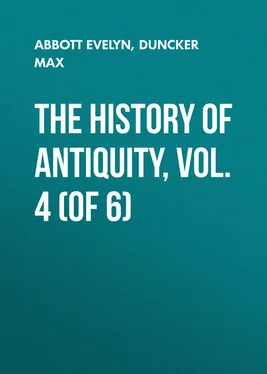Max Duncker - The History of Antiquity, Vol. 4 (of 6)
Здесь есть возможность читать онлайн «Max Duncker - The History of Antiquity, Vol. 4 (of 6)» — ознакомительный отрывок электронной книги совершенно бесплатно, а после прочтения отрывка купить полную версию. В некоторых случаях можно слушать аудио, скачать через торрент в формате fb2 и присутствует краткое содержание. Жанр: foreign_antique, foreign_prose, Историческая проза, на английском языке. Описание произведения, (предисловие) а так же отзывы посетителей доступны на портале библиотеки ЛибКат.
- Название:The History of Antiquity, Vol. 4 (of 6)
- Автор:
- Жанр:
- Год:неизвестен
- ISBN:нет данных
- Рейтинг книги:5 / 5. Голосов: 1
-
Избранное:Добавить в избранное
- Отзывы:
-
Ваша оценка:
- 100
- 1
- 2
- 3
- 4
- 5
The History of Antiquity, Vol. 4 (of 6): краткое содержание, описание и аннотация
Предлагаем к чтению аннотацию, описание, краткое содержание или предисловие (зависит от того, что написал сам автор книги «The History of Antiquity, Vol. 4 (of 6)»). Если вы не нашли необходимую информацию о книге — напишите в комментариях, мы постараемся отыскать её.
The History of Antiquity, Vol. 4 (of 6) — читать онлайн ознакомительный отрывок
Ниже представлен текст книги, разбитый по страницам. Система сохранения места последней прочитанной страницы, позволяет с удобством читать онлайн бесплатно книгу «The History of Antiquity, Vol. 4 (of 6)», без необходимости каждый раз заново искать на чём Вы остановились. Поставьте закладку, и сможете в любой момент перейти на страницу, на которой закончили чтение.
Интервал:
Закладка:
The ancient population of the new states on the Ganges was not entirely extirpated, expelled, or enslaved. Life and freedom were allowed to those who submitted and conformed to the law of the conqueror; they might pass their lives as servants on the farms of the Aryas. 155But though this remnant of the population was spared, the whole body of the immigrants looked down on them with the pride of conquerors – of superiority in arms, blood, and character – and in contrast to them they called themselves Vaiçyas, i. e. tribesmen, comrades – in other words, those who belong to the community or body of rulers. 156Whether the Vaiçya belonged to the order of the nobles, the minstrels and priests, or peasants, was a matter of indifference; he regarded the old inhabitants as an inferior species of mankind. In the land of the Ganges down to the lower course of the river this class of inhabitants bears the common name of Çudras, and as this word is unknown to Sanskrit we must assume that it was the original name of the ancient population of the Ganges, just as the tribes of the Vindhyas bear to this day the common name of Gondas. In the new states on the Ganges, therefore, the population was separated into two sharply-divided masses. How could the conquerors mix with the conquered? – how could their pride stoop to any union with the despised servants? And even if they had been willing to unite, would not the language and character of the immigrants be lost and destroyed in this mixture with tribes of rude customs and manners? As the conquered territory became more extensive, and the old inhabitants more numerous – for many were spared by the numerically weaker immigrants and continued to live among them as slaves or free out-door servants, while others hung upon the borders of the conquered regions – the more pressing was the danger that the noble blood and superior character of the immigrants, and the worship of the ancient gods, might be lost in mingling with this mass of servants. This danger co-operated with the natural pride of the conqueror, and his feeling of superiority, to place a strongly-marked separation between the Çudras and the Aryas.
In every nation which has gone beyond the primitive stages of life, wealth and occupation form the basis of a division into more or less fixed forms, more or less close orders. The states on the Ganges were no exception. Here, beside the Kshatriyas, beside the minstrels and priests, or Brahmans, stood the bulk of the immigrant Aryas, whose land required the personal labour of the owner, to whom the name Vaiçya, at first common to all, gradually passed as a special name. Below these three orders were the Çudras. The name given by the Indians to their orders, varna , i. e. colour, proves that the difference between the light skin of the immigrants and the dark colour of the native population was of considerable influence, and if a doubt were raised whether or not another population is concealed in the fourth order or Çudras, it would be removed by the close union of the three orders against the fourth, the uncompromising exclusion of the latter in all matters of religion, and the fact that the law of East Iran (the Avesta) as well as that of the Ganges, recognises warriors, priests, and peasants, but no fourth order. The sharp distinction between the Aryas and Çudras may subsequently have had an influence on the orders of the Aryas, so as to mark the divisions more strongly; resting on such a foundation, the division of orders might strike deeper roots on the Ganges than elsewhere.
The higher and more favoured strata of society will seldom be free from the desire to bequeath to posterity the advantages they possess; and this feeling makes itself felt with greater force in earlier stages of civilisation than in later. As the possessions and occupation of the father descend to the son who grows up in them, the favoured orders are inclined to maintain this natural relation, and elevate it into a legal rule; they believe that the qualification for their special calling depends on birth in it, or better blood, and make it so to depend. In the states on the Ganges these tendencies must have been the more strongly marked, as in this case the Aryas saw beneath them, in the Çudras, a class of men less capable and less cultivated than themselves; to descend to this class and mingle with it, seemed to them as disgraceful as it was dangerous to the maintenance of their empire over these men. Here it was more natural than elsewhere to pursue this analogy further – to regard even the classes of their own tribe, according to their more or less honourable occupation, as separate circles, as races having different characters and higher or lower gifts, and to transform these distinctions of occupation and social position into rigid castes. Thus the Kshatriyas, in the full consciousness of their aristocratic life, proud of their brave deeds and noble feeling, must have rendered difficult or impossible all approach to their occupation and order; they regarded the minstrels and the priests, and the Vaiçyas, as classes of inferior birth. When the minstrels had sung the praises of the ancient heroic age in the poem of the marvels of the heroes, in the Epos in its earliest form, and so arrived at more peaceful times in which everything no longer depended on the sword, a feeling of their importance and dignity must have grown up among the priests. Without them, without the accurate knowledge of the old songs and customs of sacrifice, as given by Manu and Pururavas, – without precise acquaintance with the prayers in which efficacy rested, efficient sacrifices could not be offered. We have already remarked that the amalgamation of the emigrant tribes, and the formation of the new kingdoms, brought the priests, who had hitherto belonged to the separate tribes, into closer connection and combination, and made them into a separate order. At the same time, their importance as preserving the old rites and the old faith tended to increase. The community thus arising between the priestly families led of necessity to an interchange of forms of prayer and invocations, of songs, and poems, and customs of sacrifice, the exclusive possession of which had hitherto belonged to each of these families or schools. Thus in each of the new states the priestly families attained a larger collection of songs, and a ritual which was the natural product of the liturgies of the various families, the observances regarded by one or other of these as traditional and indispensable. The traditional prayers and songs of praise were regarded as magical spells, of which even the gods could not escape the power. This exchange and combination of spells and rubrics of sacrifice no doubt made the ritual more complicated. The strictly-preserved and now extended possession of these prayers, invocations, and customs, which were known to the priests, separated that order from the Kshatriyas, and the Vaiçyas; they stood in opposition to the other orders, as the exclusive possessors of the knowledge of the customs of sacrifice, and efficient invocations. It was only among the members of this order that the correct observances and invocations were known; how could the Kshatriya or the Vaiçya avoid errors in his offering or invocation, such as would remove their efficacy and change them into their opposite? The constant increase of the prayers and forms accompanying every step in the sacrifice occupied more priests: the Hotar offered the invitation to the god to come down and receive the sacrifice; the Udgatar accompanied the preparation of the offering with the solemn forms and prayers; the Adhvaryu performed the actual rite.
Thus an equality of knowledge, advantage, and interests united the priests against the Kshatriyas, Vaiçyas, and Çudras. By the consciousness that they were in possession of the means to win the favour of the gods for the king, the nobles, and the people, the pious feeling aroused among them was greatly assisted towards gaining the recognition of the other orders. Like the Kshatriyas, they must have scorned to descend to the occupations of the Vaiçyas; they must have felt that only the priest born a priest could perform the priestly service, or offer pleasing sacrifice to the gods. They must have maintained that birth alone in the order could confer the capacity for so important and lofty a calling as theirs. If nobles and priests debarred the Vaiçyas from entrance into their order, their occupations, and modes of life, they must have been no less careful to maintain the advantages of their birth against the Çudras.
Читать дальшеИнтервал:
Закладка:
Похожие книги на «The History of Antiquity, Vol. 4 (of 6)»
Представляем Вашему вниманию похожие книги на «The History of Antiquity, Vol. 4 (of 6)» списком для выбора. Мы отобрали схожую по названию и смыслу литературу в надежде предоставить читателям больше вариантов отыскать новые, интересные, ещё непрочитанные произведения.
Обсуждение, отзывы о книге «The History of Antiquity, Vol. 4 (of 6)» и просто собственные мнения читателей. Оставьте ваши комментарии, напишите, что Вы думаете о произведении, его смысле или главных героях. Укажите что конкретно понравилось, а что нет, и почему Вы так считаете.












